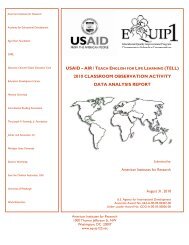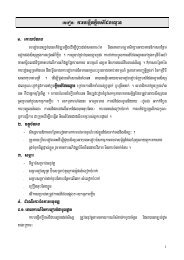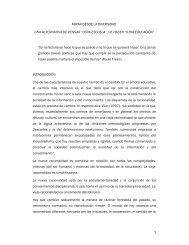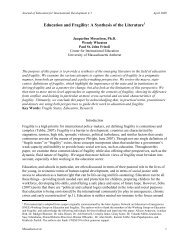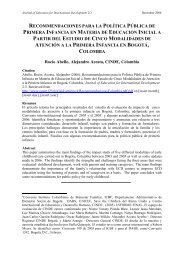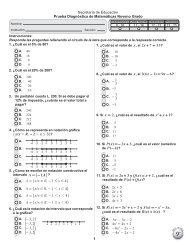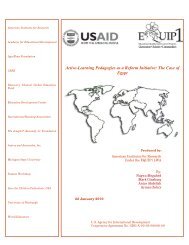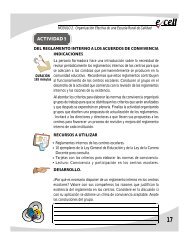The Power of Persistence: Education System ... - EQUIP123.net
The Power of Persistence: Education System ... - EQUIP123.net
The Power of Persistence: Education System ... - EQUIP123.net
You also want an ePaper? Increase the reach of your titles
YUMPU automatically turns print PDFs into web optimized ePapers that Google loves.
Selected Reform goals, Policy Changes and Programmatic Support<br />
Reform goals Policy Changes Programmatic Impact<br />
Support<br />
(bESSIP, MoESP,<br />
FNDP, JASZ)<br />
Partnership<br />
Establishment <strong>of</strong><br />
new governance and<br />
Driving program<br />
and strategy<br />
- Development <strong>of</strong><br />
MoE systems<br />
financial management development, and capacities<br />
structures facilitating coordination and for planning,<br />
MoE and Cooperating management management and<br />
Partner (CP) through partnership administration<br />
coordination<br />
structures<br />
- Hybridized funding<br />
approach with<br />
several venues<br />
for CP-MoE<br />
cooperation on<br />
planning and<br />
technical issues.<br />
- Development<br />
<strong>of</strong> a culture <strong>of</strong><br />
joint planning and<br />
management<br />
liberalization /<br />
Cost-Sharing<br />
overturn MoE policy<br />
stipulating GRZ as<br />
the sole provider <strong>of</strong><br />
Directing resources<br />
and management<br />
support to<br />
- Enrollment<br />
stagnation in<br />
government<br />
<strong>Education</strong>; Primary community schools; primary schools<br />
Schools allowed encouraging (1991-2000)<br />
to charge fees; community<br />
encouragement <strong>of</strong> participation; - Expansion <strong>of</strong><br />
non-GRZ education formalizing MoE community schools<br />
providers relationships with (1991-2006)<br />
community school<br />
bodies<br />
Decentralization Policy directing Directing resources MoE remains highly<br />
establishment, to DEbs and schools; centralized.<br />
composition and support to DEb<br />
responsibilities <strong>of</strong> capacity building<br />
DEbs<br />
Critical factors influencing the development and articulation strategies and<br />
programs designed to meet reform goals were Zambia’s economic position,<br />
structural adjustment strictures, donor influence and priorities, external<br />
confidence on issues <strong>of</strong> accountability and corruption within the Zambian<br />
Government. MOEST management and administrative capacity, and the<br />
legal framework guiding the education sector, specifically the <strong>Education</strong> Act<br />
(1966) and the Teacher Service Commission (TESC). <strong>The</strong>se are discussed in<br />
subsequent sections.<br />
116<br />
SECTION 2: lESSONS fROM COUNTRY CASE STUdIES



